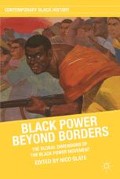Abstract
Jacqueline Dowd Hall’s essay on “the long civil rights movement” and the politics of collective memory opens with this trenchant quote from Martin Luther King, Jr. For Dowd Hall, the bowdlerization of King (“frozen in 1963, proclaiming ‘I have a dream’”) lies at the core of the sanitized narrative of the “short” civil rights movement. Dowd Hall wants us to remember King as “the democratic socialist who advocated unionization, planned the Poor People’s Campaign, and was assassinated in 1968 while supporting a sanitation workers’ strike.”1
The black revolution is much more than a struggle for the rights of Negroes. It is forcing America to face all its interrelated flaws—racism, poverty, militarism, and materialism. It is exposing evils that are rooted deeply in the whole structure of our society … and suggests that radical reconstruction of society is the real issue to be faced.
—Martin Luther King Jr.
I would like to thank Nico Slate, Joe Trotter, and the participants in the Black Power beyond Borders Conference for their comments and feedback. I also like to acknowledge my Michigan colleague Stephen Ward and the participants—especially coordinators Evelyn Brooks Higginbotham and Kenneth Mack—in the 2008–2009 workshop on “Race-Making and Law Making in the Long Civil Rights Movement” at Harvard University’s Charles Warren Center for Studies in American History, where I presented an earlier version of this chapter. Note on references: My general understanding of basic aspects of King’s biography and his role in the civil rights movement, on which the major books on his life read generally consistent, is especially indebted to David Garrow’s Bearing the Cross, Thomas Jackson’s From Civil Rights to Human Rights, the Taylor Branch trilogy, and the editor’s introductions to the King Papers in ways that extend deeper than what is formally cited herewith.
Access this chapter
Tax calculation will be finalised at checkout
Purchases are for personal use only
Preview
Unable to display preview. Download preview PDF.
Notes
Jacquelyn Dowd Hall, “The Long Civil Rights Movement and the Political Uses of the Past,” The Journal of American History 91, no. 4 (March 2005): 1234.
Few serious historians of the civil rights movement would take issue with Dowd Hall’s critique of the neoconservative whitewashing of history. However, one additional glaring problem worth noting in Dowd Hall’s essay is her failure to transcend a biracial imaginary, which I argue inhibits our ability to fully understand black/white relations as well as multiracial relations. See Kurashige , The Shifting Grounds of Race: Black and Japanese Americans in the Making of Multiethnic Los Angeles (Princeton, NJ: Princeton University Press, 2008).
Grace Lee Boggs with Scott Kurashige, The Next American Revolution: Sustainable Activism for the Twenty-First Century (Berkeley: University of California Press, 2011).
Vincent Harding, Martin Luther King, The Inconvenient Hero, rev. ed. (Maryknoll, NY: Orbis Books, 2008);
James Cone, Marin & Malcolm & America: A Dream of a Nightmare (Maryknoll, NY: Orbis Books, 1991).
Taylor Branch, Parting the Waters: America in the King Years, 1954–63 (New York: Simon & Schuster, 1988), 86.
James Boggs, The American Revolution: Pages from a Negro Worker’s Notebook (New York: Monthly Review Press, 1963); Boggs and Kurashige, Next American Revolution, 65–69.
Thomas F. Jackson, From Civil Rights to Human Rights: Martin Luther King, Jr., and the Struggle for Economic Justice (Philadelphia: University of Pennsylvania Press, 2007), 25–50.
Martin Luther King, Jr., Where Do We Go From Here: Chaos or Community? (New York: Harper and Row, 1967), 186.
David Garrow, Bearing the Cross: Martin Luther King, Jr., and the Southern Christian Leadership Conference (New York, W. Morrow, 1986), 601; “Dr. King’s Error,” The New York Times, April 7, 1967, 36; “A Tragedy,” Washington Post, April 6, 1967, A20.
See Clayborne Carson, In Struggle: SNCC and the Black Awakening of the 1960s (Cambridge, MA: Harvard University Press, 1995), 215–304.
See Charles M. Payne, I’ve Got the Light of Freedom: The Organizing Tradition and the Mississippi Freedom Struggle (Berkeley: University of California Press, 1995), especially 236.
See “Introduction” to James and Grace Lee Boggs, Revolution and Evolution in the 20th Century [RETC] (New York: Monthly Review Press, 1974), 13–23.
Editor information
Editors and Affiliations
Copyright information
© 2012 Nico Slate
About this chapter
Cite this chapter
Kurashige, S. (2012). From Black Power to a Revolution of Values: Grace Lee Boggs and the Legacy of Martin Luther King, Jr.. In: Slate, N. (eds) Black Power beyond Borders. Contemporary Black History. Palgrave Macmillan, New York. https://doi.org/10.1057/9781137295064_9
Download citation
DOI: https://doi.org/10.1057/9781137295064_9
Publisher Name: Palgrave Macmillan, New York
Print ISBN: 978-1-137-28506-5
Online ISBN: 978-1-137-29506-4
eBook Packages: Palgrave History CollectionHistory (R0)

